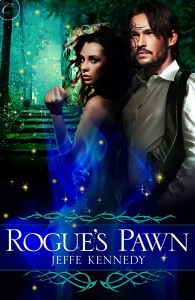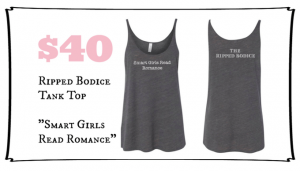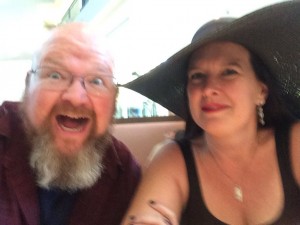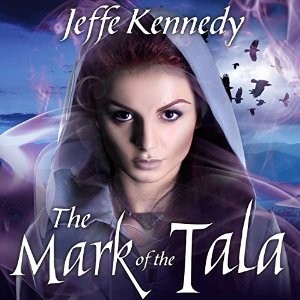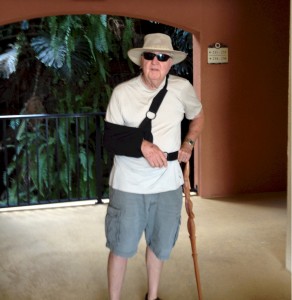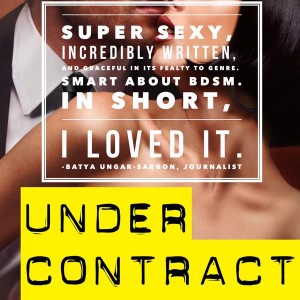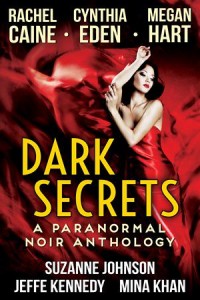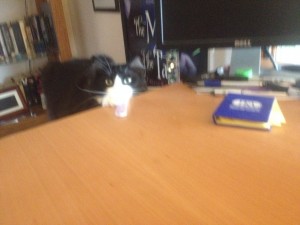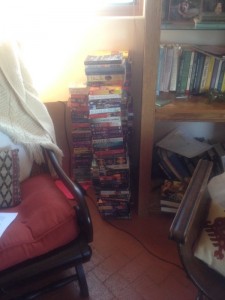 I’ve been posting to Facebook and Twitter about my project to organize my TBR pile – both physical and virtual. I’m hoping that by putting them all into a spreadsheet I can prioritize what to read next and hopefully avoid duplications. I’m really psyched to put a dent in this list! There’s 272 print, audio and ebooks on the list. (I originally said 275, but I found a few that I had indeed read on the final pass.)
I’ve been posting to Facebook and Twitter about my project to organize my TBR pile – both physical and virtual. I’m hoping that by putting them all into a spreadsheet I can prioritize what to read next and hopefully avoid duplications. I’m really psyched to put a dent in this list! There’s 272 print, audio and ebooks on the list. (I originally said 275, but I found a few that I had indeed read on the final pass.)
Several people asked to see the list, so here it is in order of author first name. I have my own list sorted according to my arcane set of priorities, but I didn’t want to share it that way, lest anyone get their feelings hurt.
Here it is!
| Pale Queen Rising (Pale Queen Series Book 1) | A. R. Kahler |
| Twisted Miracles (The Shadowminds) | A.J. Larrieu |
| Mind Sweeper (Mind Sweeper Series Book 1) | AE Jones |
| Consequences | Aleatha Romig |
| Defeat the Darkness | Alexis Morgan |
| Dark Warrior Unbroken | Alexis Morgan |
| Love in the Afternoon (Feeling the Heat Book 1) | Alison Packard |
| Atlantis Unleashed | Alyssa Day |
| Atlantis Betrayed | Alyssa Day |
| The Lair of the Twelve Princesses | Amanda C. Davis |
| The Kingdom (The Graveyard Queen Book 2) | Amanda Stevens |
| The Martian | Andy Weir |
| The Breaker’s Concubine | Ann Mayburn |
| This Is the Story of a Happy Marriage | Ann Patchett |
| Blades of the Old Empire: Book I of the Majat Code | Anna Kashina |
| The Guild of Assassins: Book Two of The Majat Code | Anna Kashina |
| The Majat Testing (The Majat Code) | Anna Kashina |
| Uncommon Passion | Anne Calhoun |
| Uncommon Pleasure | Anne Calhoun |
| The Seal’s Rebel Librarian | Anne Calhoun |
| The Seal’s Secret | Anne Calhoun |
| The Seal’s Second Chance | Anne Calhoun |
| Evening Storm | Anne Calhoun |
| Transcendent (Irresistible Series Book 2) | Anne Calhoun |
| Jaded | Anne Calhoun |
| The Girl in 6E | AR Torre |
| The Poetics | Aristotle |
| The All You Can Dream Buffet | Barbara O’Neal |
| Solatium (Emanations, an urban fantasy series Book 2) | Becca Mills |
| Passion Play | Beth Bernobich |
| The Creative Fire (Ruby’s Song) | Brenda Cooper |
| Black Sun Rising: The Coldfire Trilogy, Book One | C.S. Friedman |
| Crown of Shadows: The Coldfire Trilogy, Book Three | C.S. Friedman |
| When True Night Falls: The Coldfire Trilogy, Book Two | C.S. Friedman |
| Silk | Caitlin R Kiernan |
| Touch Me | Callie Croix |
| Wind Follower | Carole McDonnell |
| Free Fall (A My Immortals Series Demons and Witches novella) | Carolyn Jewel |
| Eyes Like Sky And Coal And Moonlight | Cat Rambo |
| Always and Forever | Cathy Kelly |
| With this Ring | Celeste Bradley |
| 1 Dead in Attic | Chris Rose |
| Losing Mum and Pup | Christopher Buckley |
| Lady of Light and Shadows | CL Wilson |
| King of Sword and Sky | CL Wilson |
| Queen of Song and Souls | CL Wilson |
| Crown of Crystal Flame | CL Wilson |
| The Shadow Revolution: Crown & Key | Clay Griffith |
| A Malady of Magicks (The Ebenezum Series Book 1) | Craig Shaw Gardner |
| Unlovable | Cynthia St. Aubin |
| Hot Head | Damon Suede |
| Reluctant Concubine (Hardstorm Saga Book 1) | Dana Marton |
| The Tao of Jung – the Way of lntegrity | David Rosen |
| Dying Bites: The Bloodhound Files | DD Barant |
| Dream | Del Dryden |
| Sex on the Beach | Del Dryden |
| Mai Tai for Two | Del Dryden |
| Bitter Night | Diana Pharaoh Francis |
| Charmed Life (Chronicles of Chrestomanci Book 1) | Diana Wynne Jones |
| The Thirteenth Tale: A Novel | Diane Setterfield |
| The Thirteenth Tale | Diane Setterfield |
| The Thousand Names: Book One of the Shadow Campaigns | Django Wexler |
| The Reckoners | Doranna Durgin |
| Storm of Reckoning | Doranna Durgin |
| The Beauty’s Beast | ED Walker |
| The Heaven Tree trilogy | Edith Pagetter |
| Cheerful – By Request | Edna Ferber |
| Erotic Poems | ee cummings |
| Twisted | Elisabeth Naughton |
| Slave To Pleasure | Eliza Gayle |
| Eat Pray Love | Elizabeth Gilbert |
| A Hidden Fire: Elemental Mysteries Book One | Elizabeth Hunter |
| The Seduction of Lady Phoebe (The Marriage Game Book 1) | Ella Quinn |
| Strange Attractions (Berkley Sensation) | Emma Holly |
| Master of the Game | Emma Petersen |
| Blood Cursed | Erica Hayes |
| Shadow Bound | Erin Kellison |
| The Secret Heart (No Better Angels Book 1) | Erin Satie |
| A Vampire Quintet | Eugie Foster |
| Blood Cross: A Jane Yellowrock Novel | Faith Hunter |
| You’re Never Weird on the Internet | Felicia Day |
| Boomerang Bride | Fiona Lowe |
| Dead Man’s Rain (The Markhat Files Book 2) | Frank Tuttle |
| Dragon Actually (Dragon Kin series Book 1) | G. A. Aiken |
| His Last Duchess | Gabrielle Kimm |
| Sabriel (The Old Kingdom Book 1) | Garth Nix |
| The Darkest Kiss | Gena Showalter |
| Home Fires | Gene Wolfe |
| Phantastes | George MacDonald |
| Love Letters Volume 1: Obeying Desire (The Love Letters) | Ginny Glass |
| The Duke’s Disaster | Grace Burrowes |
| Douglas | Grace Burrowes |
| The Lightning God’s Wife: a short story | Grace Draven |
| The Collected Stories | Grace Paley |
| The Lions of Al-Rassan | Guy Gavriel Kay |
| Romancing the Holiday: We’ll Be Home for Christmas\Ask Her.. | HelenKay Dimon |
| The Secret of the Unicorn | Herge |
| Atonement | Ian McEwan |
| Burn for Me | Ilona Andrews |
| Thorn | Intisar Khanani |
| Faery Song | Isabo Kelly |
| Obernewtyn: The Obernewtyn Chronicles 1 | Isobelle Carmody |
| The Golden City | J. Kathleen Cheney |
| Renegade | JA Souders |
| Naamah’s Curse (Moirin’s Trilogy Book 2) | Jacqueline Carey |
| Santa Olivia | Jacqueline Carey |
| The Golden Bough | James George Frazer |
| Persuasion (Illustrated) | Jane Austen |
| The King’s Viper | Janine Ashbless |
| Warhost of Vastmark | Janny Wurts |
| The Curse of the Mistwraith | Janny Wurts |
| Management Skills | January Rowe |
| Better When He’s Bad | Jay Crownover |
| Three Hearts | JC Nelson |
| Leopard Moon (Moon series Book 1) | Jeanette Battista |
| Up from the Grave | Jeaniene Frost |
| Blood Drive | Jeanne C Stein |
| Karma Girl (The Bigtime series Book 1) | Jennifer Estep |
| Don’t Breathe a Word: A Novel | Jennifer McMahon |
| The Scarecrow King: A Romantic Retelling of the King.. | Jill Myles |
| Always on My Mind | Jill Shalvis |
| Tempted by His Target | Jill Sorenson |
| Storm Front (The Dresden Files, Book 1) | Jim Butcher |
| The Lady’s Secret | Joanna Chambers |
| The Harlot Countess | Joanna Shupe |
| Incarnate | Jodi Meadows |
| Redshirts: Chapters 1-4 | John Scalzi |
| Johannes Cabal, the Necromancer | Jonathan L Howard |
| Beast (Avon Romantic Treasure) | Judith Ivory |
| It’s in His Kiss | Julia Quinn |
| When He was Wicked | Julia Quinn |
| Caress of Darkness | Julie Kenner |
| Wanted | Julie Kenner |
| Say My Name | Julie Kenner |
| Larcout (Fire Born, Blood Blessed Book 1) | K.A. Krantz |
| Red Hot Holiday: Wish List\I Need You for Christmas\Breath.. | K.A. Mitchell |
| Grave Witch | Kalayna Price |
| Heart of the Dragon’s Realm | Karalynn Lee |
| Inked (Cassie Palmer) | Karen Chance |
| Changeling: Prelude to the Chosen Chronicles | Karen Dales |
| Greywalker | Kat Richardson |
| Spirit Gate | Kate Elliott |
| King’s Dragon | Kate Elliott |
| Simply Sinful | Kate Pearce |
| A Lady’s Wish | Katharine Ashe |
| Breakdown | Katherine Amt Hanna |
| Everlasting | Kathleen Woodiwiss |
| A Match Made in Texas | Katie Lane |
| Ring in the Holidays | Katie Lane |
| Uncommon Arrangements: Married Life in London Literary Circles | Katie Roiphe |
| The Middle Place | Kelly Corrigan |
| The Better Part of Darkness | Kelly Gay |
| The Darkest Kiss | Keri Arthur |
| Embraced in Darkness | Keri Arthur |
| Hounded | Kevin Hearne |
| Synthetic Dreams | Kim Knox |
| Dark Needs at Night’s Edge | Kresley Cole |
| Own the Wind | Kristen Ashley |
| Daughter of Smoke and Bone | Laini Taylor |
| Lethal Rider | Larissa Ione |
| The Chocolate Rose: (A Prequel to La Vie en Roses Series) | Laura Florand |
| The Prince of Midnight | Laura Kinsale |
| By Royal Command | Laura Navarre |
| Goddess With a Blade | Lauren Dane |
| Last Night at Chateau Marmont | Lauren Weisberger |
| Touchstone | Laurie R. King |
| Shadow and Bone | Leigh Bardugo |
| Secrets of the Sands | Leona Wisoker |
| Grave Illusions (Jess Vandermire, Vampire Hunter Book 1) | Lina Gardiner |
| Games of Command | Linnea Sinclair |
| Hope’s Folly | Linnea Sinclair |
| A Civil Campaign | Lois McMaster Bujold |
| A Civil Campaign (Vorkosigan Saga Book 12) | Lois McMaster Bujold |
| Spellbent | Lucy A. Snyder |
| Bonds of Trust & Bonds of Need | Lynda Aicher |
| Dearest Friend | Lynne Withey |
| The Worth of a Shell (The Stone Moon Trilogy Book 1) | M.C.A. Hogarth |
| Blood of the Sorceress | Maggie Shayne |
| The Raven Boys | Maggie Stiefvater |
| Avenge Me | Maisey Yates |
| Nightmare Ink (A Living Ink Novel) | Marcella Burnard |
| The Blind Assassin | Margaret Atwood |
| The Year of the Flood (MaddAddam Trilogy, Book 2) | Margaret Atwood |
| Midnight Never Come | Marie Brennan |
| Beauty and the Wolf (The Cursed Princes Book 1) | Marina Myles |
| Undead Kama Sutra | Mario Acevedo |
| The Woman at the Washington Zoo | Marjorie Williams |
| Unfallen Dead | Mark del Franco |
| Thief of Songs | MCA Hogarth |
| The Position: A Novel | Meg Wolitzer |
| The Ten-Year Nap | Meg Wolitzer |
| Little Secrets | Megan Hart |
| Hold Me Close | Megan Hart |
| Tempted | Megan Hart |
| A Red Hot Valentine’s Day | Megan Hart |
| No Greater Pleasure | Megan Hart |
| If the Shoe Fits (Unruly Royals Book 2) | Megan Mulry |
| In Love Again (Unruly Royals Book 3) | Megan Mulry |
| A Little Harmless Submission | Melissa Schroeder |
| Home from the Sea | Mercedes Lackey |
| Archer’s Voice | Mia Sheridan |
| Cast in Shadow (Chronicles of Elantra, Book 1) (The.. | Michelle Sagara |
| The Duke of Dark Desires (The Wild Quartet) | Miranda Neville |
| The Importance of Being Wicked | Miranda Neville |
| Fire Kin | MJ Scott |
| The Magic of Recluce (saga of recluce Book 1) | Modesitt Jr. |
| Falling Kingdoms | Morgan Rhodes |
| Loving Frank | Nancy Horan |
| Uprooted | Naomi Novik |
| Think and Grow Rich | Napoleon Hill |
| Fight or Flight | Natalie Damschroder |
| Neverwhere | Neil Gaiman |
| The Liar | Nora Roberts |
| The Modern Fae’s Guide to Surviving Humanity (Daw Book.. | Palmatier |
| Scions: Insurrection | Patrice Michelle |
| Alphabet of Thorn | Patricia McKillip |
| Some Boys | Patty Blount |
| The Green Man and the Dragon | Paul Broadhurst |
| The Winter Witch | Paula Brackston |
| The Warded Man | Peter V Brett |
| Plato’s Erotic Dialogues | Plato |
| The Scroll Thief (A Tale of Ithian) | R.F. Long |
| Love Without Blood | Raz Steel |
| The Bridge | Rebecca Rogers Maher |
| The Red Wolf Conspiracy | Robert V.S. Redick |
| Assassin’s Apprentice (The Farseer Trilogy, Book 1) | Robin Hobb |
| Shadows | Robin McKinley |
| Water – Tales of Elemental Spirits | Robin McKinley |
| A Knot in the Grain and other stories | Robin McKinley |
| Fire: Tales of Elemental Spirits (Firebird Fantasy) | Robin Mckinley |
| The Door in the Hedge | Robin McKinley |
| Deeper | Robin York |
| Fallen | Roselynn Cannes |
| Sunset Rising: Book One | S. McEachern |
| The Twelve Nights of Christmas (Snowkissed and Seduced!) | Sarah Morgan |
| Rosemary and Rue: Book One of Toby Daye (October Daye Series.. | Seanan McGuire |
| Slow Summer Kisses | Shannon Stacey |
| Mystic and Rider (Twelve Houses series Book 1) | Sharon Shinn |
| Journey of Awakening (The Triune Stones) | Shawna Thomas |
| It’s In His Heart (A Red River Valley Novel) | Shelly Alexander |
| His at Night (The London Trilogy Series) | Sherry Thomas |
| Demon’s Captive (War Tribe Book 1) | Stephanie Snow |
| Daughter of Regals and Other Tales | Stephen R Donaldson |
| First Blood (The Guardians series) | Susan Sizemore |
| The Splendour Falls | Susanna Kearsley |
| The Winter Sea | Susanna Kearsley |
| The Admiral’s Bride (Tall, Dark and Dangerous Book 7) | Suzanne Brockmann |
| Pirate’s Alley (Sentinels of New Orleans Book 4) | Suzanne Johnson |
| Riding the Storm (ACRO Series Book 1) | Sydney Croft |
| Spellbound | Sylvia Day |
| Afterburn & Aftershock | Sylvia Day |
| Alanna: The First Adventure (Song of the Lioness series Book.. | Tamora Pierce |
| Terrier: The Legend of Beka Cooper #1 | Tamora Pierce |
| It Had to Be Him (An It Had to Be Novel Book 1) | Tamra Baumann |
| Getting Dumped – Part 1 A Shultz Sisters Mystery | Tawna Fenske |
| The Color of Magic (Discworld Book 1) | Terry Pratchett |
| A Night to Surrender | Tessa Dare |
| Jitterbug Perfume | Tom Robbins |
| Vicious | V. E. Schwab |
| Property | Valerie Martin |
| What My Mother Gave Me | Various |
| Rocket Dragons Ignite | Various |
| Worlds of Edgar Rice Burroughs | Various |
| Star Cruise: Marooned | Veronica Scott |
| A Rake’s Guide To Pleasure (Zebra Historical Romance) | Victoria Dahl |
| Fanning the Flames: A Girls’ Night Out novella (Jackson:.. | Victoria Dahl |
| The Guy Next Door | Victoria Dahl |
| Carolina Man | Virginia Kantra |
| Distrust That Particular Flavor | William Gibson |
| Spook Country | William Gibson |
| The Xandra King Erotic Romance Collection: Celestina and the.. | Xandra King |
| The Curious Trio | Yoko Tsuno |
